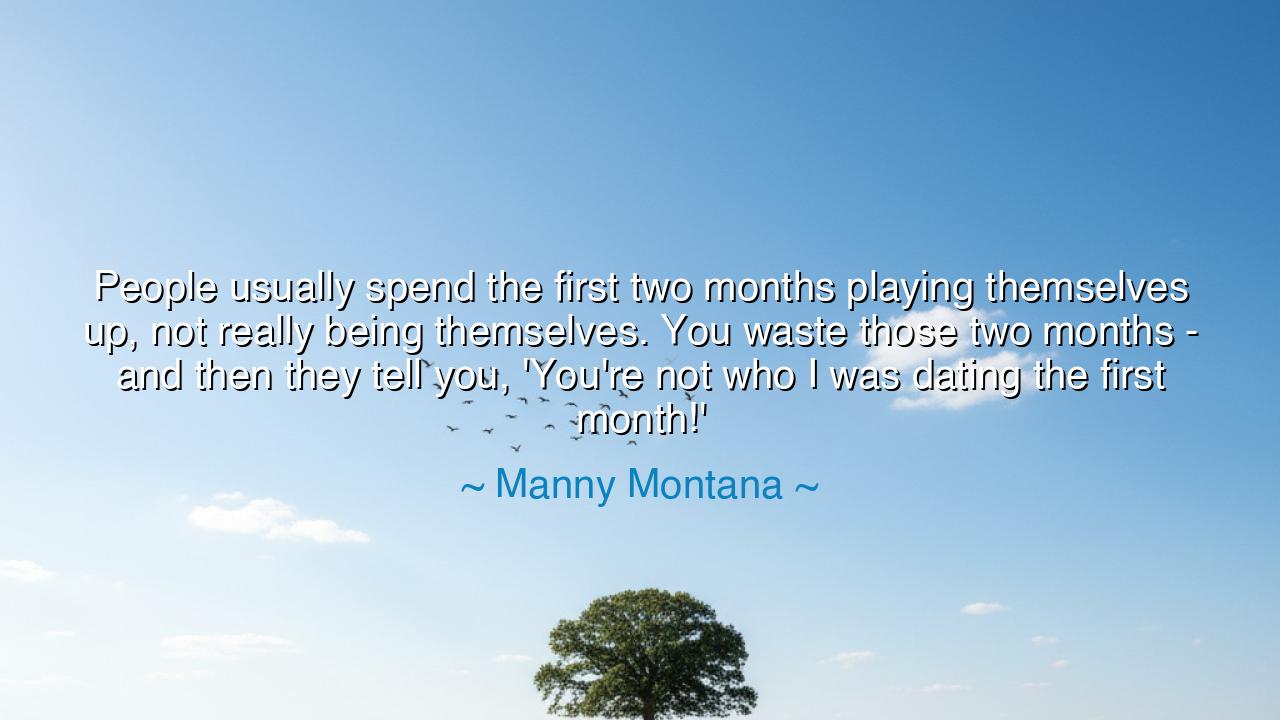
People usually spend the first two months playing themselves up
People usually spend the first two months playing themselves up, not really being themselves. You waste those two months - and then they tell you, 'You're not who I was dating the first month!'






In the court of first impressions, a hard proverb is spoken with a wry smile: “People usually spend the first two months playing themselves up, not really being themselves… You waste those two months—and then they say, ‘You’re not who I was dating the first month!’” Hear the ancient warning under the modern cadence. The beginning of love is often a festival of masks: we polish our stories, sand down our edges, and sell a gleaming version of the self. Yet what is bought on illusion is later paid for in disillusion. Time, that incorruptible auditor, returns with the ledger and asks for the truth we withheld.
The elders would have said: beware the banquet of peacocks. For a while the bright plumage dazzles, but the soul cannot flap borrowed feathers forever. To play oneself up is to mortgage tomorrow’s trust for today’s applause. The heart you woo must one day share your winter, not only your summer; your unguarded mornings, not only your curated evenings. When the gloss thins and the grain shows, the other cries out, “You’re not who I was dating the first month!”—and the cry is just, for you offered a mask as a covenant.
The origin of this wisdom is older than apps and candlelit rooms. In the Heian courts of Japan, lovers courted by poetry screens and midnight visits, veiling flaws with silk and syllable. Diaries tell how the idealized exchange, so exquisite at the start, curdled when daylight revealed ordinary tempers and unlyrical habits. The lesson travelled across centuries to the letters of John and Abigail Adams, who—refusing mere performative grace—wrote each other frankly of doubts, duties, money, illness, and hope. Their affection endured because it was apprenticed to reality; their first months were not theater but rehearsal for a life.
This proverb also names a cruelty we commit against ourselves. For two shining months we manage an unsustainable script—laugh at jokes we do not love, nod at plans we cannot live, hide the tiredness that is simply human. The cost is not only the partner’s disappointment; it is our own exhaustion. False beginnings are heavy. They make us actors in a play that has no closing night. Small wonder that honesty, when finally spoken, sounds like betrayal; we introduced it too late, as if truth were a stranger in our own house.
Yet there is a braver way to begin. Let the first season be a school, not a spectacle. Offer the unvarnished timbre of your day: what you fear, how you rest, the pace you can sustain. Reveal the shape of your loyalties and the borders of your time. The paradox is ancient: candor—risked early—creates desire that does not wilt. We are drawn not to perfection but to coherence, to a life whose parts agree. The “little embarrassments” of authenticity become the handholds of trust.
Take from this a clear teaching for the apprentices of love. Make a covenant with the ordinary. Choose one small ritual you can keep when the fireflies of novelty fade: a weekly check-in, a shared silence, a task done side by side. On the first three dates, name one weakness and one boundary; let the other do the same. Replace ornament with pattern: show, twice, how you handle being late; show, twice, how you apologize. Thus you invest in recognizability—the gift that keeps a heart from feeling duped when the curtain falls.
And carry these practical rites like coins for the road: (1) In the first month, state your non-negotiables without swagger; humility seals them better than bravado. (2) In the second month, invite the other into a real corner of your life—your workspace, your family call, your grocery list—so performance gives way to presence. (3) Refuse the economy of flattery; trade in the currency of consistent actions. (4) When you feel the urge to embellish, breathe and choose a plainer sentence. Do these, and you will not waste your two months on illusion; you will build a beginning sturdy enough to bear the seasons—and no one will need to say, with hurt surprise, “You’re not who I was dating the first month.”






AAdministratorAdministrator
Welcome, honored guests. Please leave a comment, we will respond soon